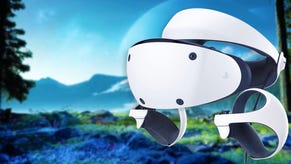Ubisoft storms E3 with a vital reminder that video games are human and fun
Jaded?
Selling video games to people who like video games should not be hard. Often, though, it seems like the hardest thing in the world - especially at E3, where even the greats can stumble on stage. Over the last few years, it seems to have been getting harder and harder, too. Each summer, EA struggles bravely to simulate convincing human behaviour as it trots viewers through the mega-brands. Bethesda scowls through the smoke and gunfire as it conjures Nazis and radioactive horrors. Microsoft opts for T-shirts and leather jackets, and looks less like a new Top Gear presenting team, which would be bad enough, and more like a series of rookie commanders-in-chief, lecturing the troops on the deck of a battleship. And it never really feels like it's anybody's fault. It just feels like glossy conferences are a deeply imperfect means for exploring the joys of this particular industry. They're good at expressing the idea that games are a serious business, that they are expensive undertakings put together by serious professionals, but they're less good at acknowledging that games are fun, that they're amongst the most human of human artefacts, even if underneath it all they're made of light and maths.
Enter Ubisoft. For the last few years it's had an unfair advantage, of course: Aisha Tyler, a sharp and witty presenter who was able to bring even the wonkiest of segues home and speak like a real human being regardless of what psychedelic oddity she was cuing up next. This time around, though, Tyler's nowhere to be seen, and so everyone feared the worst. We should not have feared. Ubisoft smashed it. Not just because of the games, either, although there were some wonderful looking treats on display, along with a couple of genuine dazzlers. Ubisoft smashed it because it remembered that video games are brilliant - and the people who make them are brilliant, too. Other publishers and platform holders try to create epics at E3. Ubisoft's conference felt like WarioWare.
Ubisoft has done this before. The best E3 moment ever - and this is not up for discussion - was the Child of Eden curtain raiser back in the day: a slender man stood with his back to the audience, the white gloves, the neat suit, the conductor's stance. He turns, and it's Mizuguchi. It's Mizuguchi and the spiritual successor to Rez. A short demo. Loud music. A bow, a smile, and he's off. Pure magic.
The magic was back this year. Rabbids and Mario should have been a bit of a disaster. Mario wielding a gun should be a huge disaster. And yet here's Yves and Shigeru Miyamoto, laughing and chatting and messing about with props. Here's a weird blend of Mario and XCOM that goes from curio to essential in the time it takes for the video games math to click in your head. And here - best of all - is the guy behind the project, sat in the audience, blinking back tears at what he is watching. Xbox had a supremely powerful box, but struggled to make a case for what you might be playing on it. This Rabbids game would probably work on my daughter's tablet, but Ubisoft's not selling the tech, but the artistry, and offering a glimpse of the people who made it.
That was a pretty good start, and it carried through a bunch of firmly established games that offered little more than stylish trailers: Assassin's is Assassin's is Assassin's by this point, although I'd love to know about the behind-the-scenes deal-making that meant the developers could only show live gameplay running on a tiny monitor balanced on a coffee table. The Crew 2 looked seriously pretty as Monument Valley descended from the skies above Manhattan, folding all of the US into a huge asphalt Rubik's Cube. Even when it's dealing with a known quantity, Ubisoft knows how to bring a bit of flare and showbiz to proceedings. And then it follows up the sizzle-reel with a developer, explaining themselves to the world in quirky language that can only be their own voices.
That was the entire conference, in fact: a parade of developers and their colourful, often rather strange products, presented with a confidence that suggested that there was a place for all of this within games. South Park card battler? No problem. Toys to Life space dog-fighting game in which it's sort of hard to imagine how you're going to hold the controller with all that crap clipped onto it? Why not. Olympics expansion for a winter sports game that only about thirty people around the world - myself included - seem to have truly clicked with? Absolutely. Just Dance? Just as long as we can get people dancing on stage! Elijah Wood exploring his own psyche in a VR, FMV cross-over? Do you even have to ask by this point?
The quirk is glorious, but there's something wonderfully knowing about Ubisoft at times, too. It's there in the way its developers are willing to represent wacky, open-minded Europe, even when it's walking you through another open-world FPS about extremism. It's there in the way that you don't have to squint at its games too hard to sense the thriftiness that is sometimes involved in putting them together. Ship combat in Assassin's Creed always seemed like an expensive indulgence - but here's another franchise piggybacking on all that hard work, in the form of multiplayer pirate-'em-up Skull and Bones. Here's the convergence of open-world systems so that the teams behind expansive car games can, presumably, step in to help with the development of expansive shooting games. Ubisoft is more willing than most publishers to give a sense of how the sausage is getting made - and as a result, it's perhaps more willing than most to take risks.
And end on a risk, in fact, which, glorious and crowd-pleasing as it was, is exactly what Beyond Good and Evil 2 represents. This is a big budget sequel to a beloved game that was also a bit of a bomb at the time. And yet it's back, victorious, and looking like nothing else around, because it's had time - almost fifteen years, according to Michel Ancel, which I desperately hope isn't true - to find its moment. Is this its moment? Will it even come out this time? Who can say? What you can say is that this game that features more than its fair share of intergalactic farmyard animals slots in well alongside Mario and Rabbids and that weird Roomba thing, alongside those recycled pirates and clip-on space fighters and day-glo dancers - and all the people who brought them to the screen - to make a line-up that reminds us that games are at their most vivid when they're every bit as weird and human and awkward and brilliant as life itself.
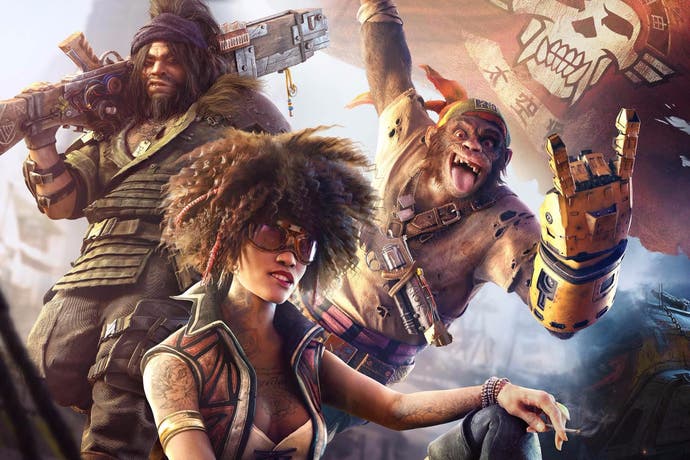



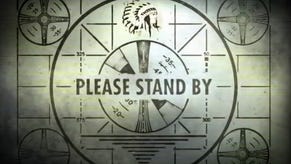

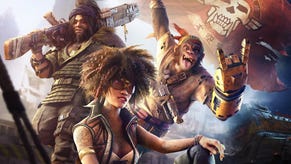
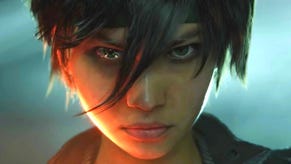
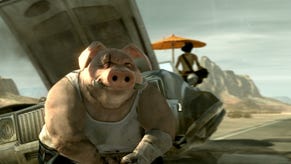
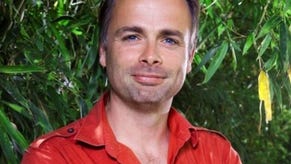
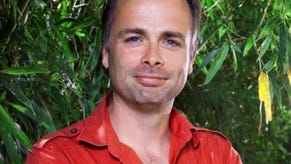

-3-31-23-screenshot.png?width=291&height=164&fit=crop&quality=80&format=jpg&auto=webp)





